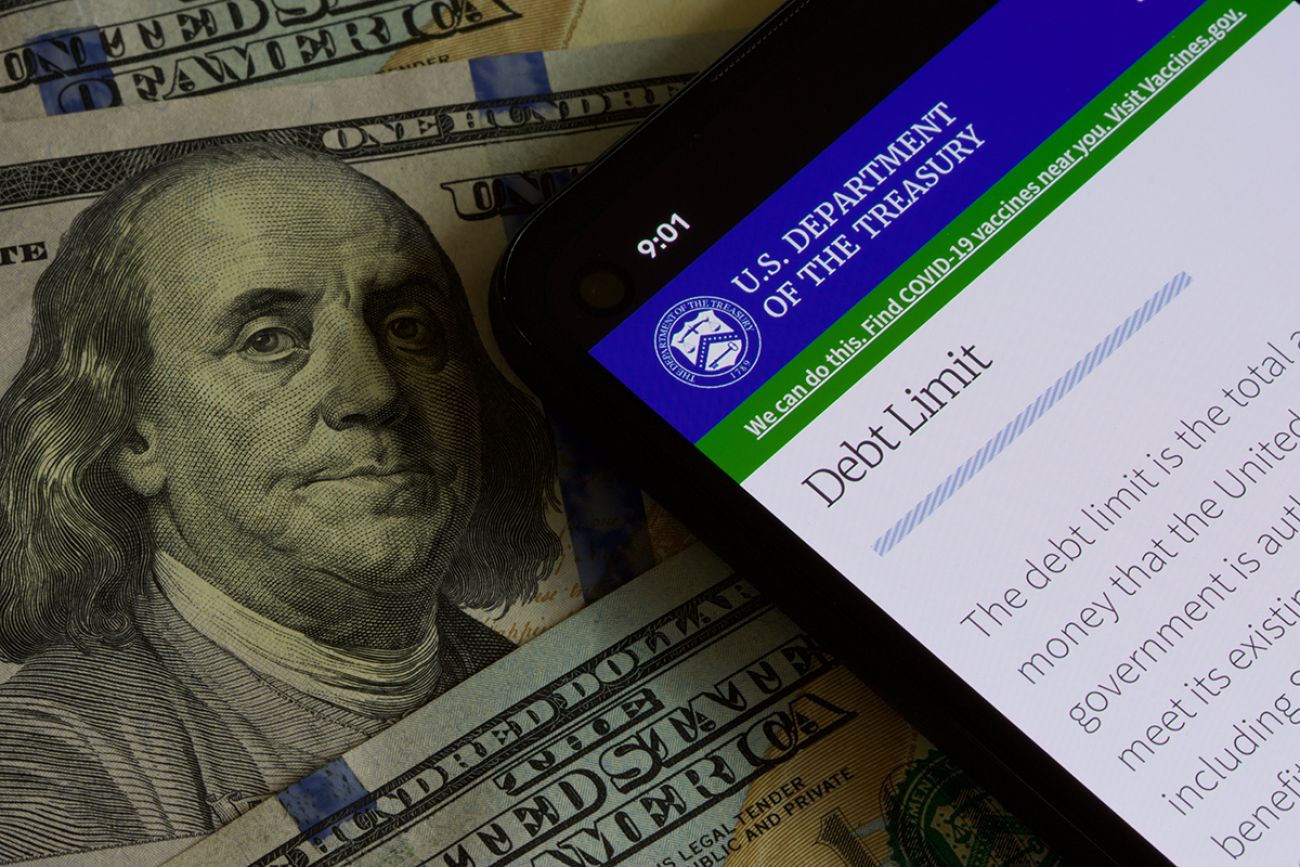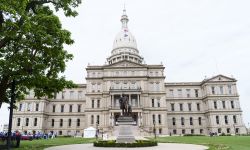What is the debt ceiling and why Michigan should care if the U.S. defaults

- The U.S. can cover its debt until about June 1 if Washington is not able to agree before then on a deal to raise the debt limit
- Without a deal, funding for federal payrolls, VA benefits and Meals on Wheels could be paused
- Democrats and Republicans are divided over whether budget conditions should be attached to a debt ceiling deal
Drama continues to mount in Washington, D.C., as House Republicans demand deep spending cuts from the Biden administration in return for their vote to raise the $31.4 trillion U.S. debt ceiling and avoid fiscal calamity.
At risk is whether the nation will be able to pay its bills, many of which involve spending that Americans have come to expect. Social Security benefits, Veterans Administration medical costs, Meals on Wheels food deliveries to seniors and federal payrolls all hang in the balance, financial experts say.
Experts say the standoff also risks producing a faltering stock market, possible recession and staggering damage to the nation’s global economic leadership. The U.S. has never defaulted on its debt.
Related:
- Michigan business leaders mildly hopeful despite lagging GDP, income
- Robust jobs market in January suggests economy not ‘cooling’ as predicted
- Michigan braces for recession: What to watch, from inflation to home prices
“If, heaven forbid, we were actually to default, the results could be catastrophic,” Charley Ballard, economist at Michigan State University, told Bridge Michigan.
Here’s what you need to know:
What’s the urgency?
The U.S. could run out of money to pay its bills as early as June 1 if the debt limit is not raised, Treasury Secretary Janet Yellen warned this week in a letter to Congress.
Yellen’s message appears to have ratcheted up urgency that has been brewing in recent weeks. Earlier estimates had put the date later in July. While Democrats have said they refuse to negotiate with Republicans over raising the debt limit, House Republicans passed a bill in late April tying approval to future spending cuts — including EV tax breaks and manufacturing incentives, which could affect Michigan.
President Joe Biden has invited Congressional leaders from both parties to the White House on Tuesday. He reportedly will urge them to avoid defaulting on the nation’s debt, then negotiate spending disagreements separately as part of budget talks, something advocated by Michigan Sen. Debbie Stabenow, a Democrat, on Thursday during a hearing by the Senate Committee on the Budget.
But with few solutions emerging and just weeks until a potential federal shutdown, the political conflict may escalate.
“It looks like things will heat up,” Daniil Manaenkov, an economist at the University of Michigan, told Bridge. Also likely, he said, is U.S. financial turbulence.
What is the debt limit?
The debt limit, as defined by the U.S. Treasury, is the total amount of money that the United States government is authorized to borrow to meet its existing legal obligations. Those obligations include Social Security and Medicare benefits, military salaries, interest on the national debt, tax refunds, and other payments.
The government instituted the debt limit just before World War II, as all federal debt was consolidated under the Treasury Department.
Because the debt ceiling is a specific dollar amount, it’s been raised dozens to times due to factors like inflation, population growth and government spending.
Once the ceiling is reached, the Treasury Department is not able to issue new debt securities to fund all expenditures, Manaenkov said. That forces it to choose what expenditures can be delayed, and can result in actions like a government shutdown.
Part of Thursday’s Senate hearing focused on the federal deficit, which Brian Riedl, Senior Fellow at Manhattan Institute, said will be about $1.5 trillion this year, and could approach $3 trillion over the next decade. Over 30 years, some projections say the federal deficit will reach 100 percent of U.S. tax collections, he added.
Congress should be working to avert what Riedl called an “otherwise inevitable debt crisis.”
Historically, Riedl said, “debt limit showdowns are relatively rare because both sides recognize the need to include fiscal reforms.”
At the same time, the debt ceiling reflects money that’s already been committed, Antonio Doblas Madrid, a Michigan State University economist, told Bridge Michigan.
Stopping payments, he said, “doesn’t make sense.”
“Maybe if it was understood better, (negotiating over the debt ceiling) would have less support,” Doblas Madrid said. “It may sound like, ‘debt is bad,’ so raising the debt limit would mean getting into more debt. It may sound superficially responsible.
“But,” he said, “it’s the polar opposite.”
Why it’s a national concern
"We shouldn't even be talking about a world in which the U.S. doesn't pay its bills. It just shouldn't be a thing," Federal Reserve Chairman Jerome Powell said at a press conference Wednesday.
Powell spoke after the Fed raised the federal fund interest rate, which is the rate paid by lenders, by 0.25 percentage point. The increase was the 10th since March 2022 as the central banking system tries to cool inflation without initiating a recession.
"No one should assume that the Fed can really protect the economy and the financial system and our reputation globally from the damage that such an event might inflict," Powell said of a potential U.S. default.
The Fed moves have increased the costs of borrowing for businesses and consumers, who now pay twice as much in interest on mortgages as well as higher costs for credit cards and other loans as they did in 2022.
Not addressing the debt ceiling will result in a downgrade of the nation’s credit rating, MSU’s Doblas Madrid said. Treasury-based investments will no longer be as stable and the U.S. would gain a reputation as an entity that doesn’t pay its bills.
Like U-M’s Manaenkov, Doblas Madris said anxiety over whether the nation will avoid default could show up in the investor market — including the stock market — before the deadline.
While there’s never “an opportune time to have a political debate over the debt,” Mark Zandi, chief economist at Moody’s Analytics, a financial risk management firm, said during Thursday’s hearing the economy’s recent struggles may mean more risk today.
Interest rate hikes “created tremendous pressure on the economy and of course on the banking system,” he said. “The banking system is struggling as well at this point. And while it feels like the worst of the crisis is over, it's still simmering, and the fallout is yet to be filled in terms of credit availability, and what it means for small business, commercial real estate and other parts of the economy.”
He continued: “We need to end this drama as quickly as possible.”
Looking ahead
Today’s debt ceiling divide marks the 10th time in 13 years that Republicans and Democrats have confronted the nation’s debt cap. Recent previous moves to raise the debt ceiling include one under Biden and three under then-President Donald Trump.
The last impasse took place in fall 2021, when the limit was $28.9 trillion. In a last-minute move that year, Congress passed legislation raising the limit by $2.5 trillion to today’s $31.4 trillion.
“Neither party’s hands are really clean on debt limits,” Riedl, of the Manhattan Institute, said at Thursday’s Senate budget hearing.
Last week, House Republicans narrowly passed a bill allowing a temporary $1.5 trillion increase to the debt ceiling, but on the condition that Democrats and the White House agree to steep spending cuts. The vote was 217-215.
The bill is “clearly an opening bid in negotiations,” U-M’s Manaenkov said. He noted that the bill passed by the House would expire next March, “basically setting the stage for future negotiations next year.”
Experts say the GOP measure has little chance of passing in the Democratic-led Senate.
However, Republicans considered passage a victory. Among the spending cuts included was a rollback of overall federal spending and the return of unspent federal COVID-19 funding.
In addition, recipients of food stamps and other government aid would face tougher work requirements, while Biden’s student loan forgiveness program would be halted.
Any pain specific to Michigan?
Of note to Michigan as it seeks more electric vehicle manufacturing and infrastructure spending is that energy also plays a role in the House bill. Many of the Democratic tax breaks, such as for EV purchases, would end, while oil, gas and coal production could increase.
Ballard, of Michigan State, has said that one solution to the recurring debt ceiling debates could come from a court challenge to the process. Ballard notes that Section 4 of the 14th Amendment to the U.S. Constitution asserts that paying the nation’s debts “shall not be questioned.”
U-M’s Manaenkov considers the 14th amendment legal challenge more risky. Instead, he envisions “establishment of some kind of deficit reduction commission and maybe a rescission of some unspent Covid funds is the likely end game.”
Business Watch
Covering the intersection of business and policy, and informing Michigan employers and workers on the long road back from coronavirus.
- About Business Watch
- Subscribe
- Share tips and questions with Bridge Business Editor Paula Gardner
Thanks to our Business Watch sponsors.
Support Bridge's nonprofit civic journalism. Donate today.
See what new members are saying about why they donated to Bridge Michigan:
- “In order for this information to be accurate and unbiased it must be underwritten by its readers, not by special interests.” - Larry S.
- “Not many other media sources report on the topics Bridge does.” - Susan B.
- “Your journalism is outstanding and rare these days.” - Mark S.
If you want to ensure the future of nonpartisan, nonprofit Michigan journalism, please become a member today. You, too, will be asked why you donated and maybe we'll feature your quote next time!




